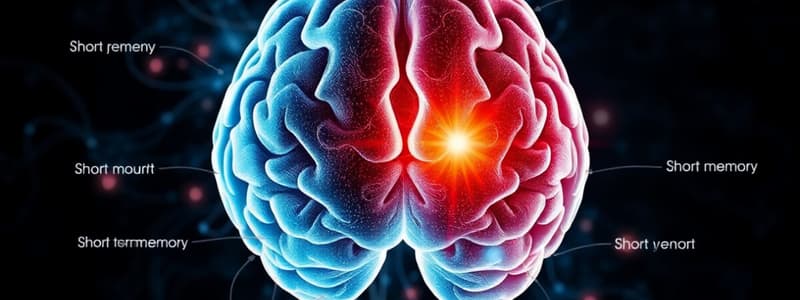Podcast
Questions and Answers
What is the duration of iconic memory?
What is the duration of iconic memory?
- About 5 seconds
- 1 to 2 seconds
- Less than 1 second (correct)
- 10 seconds or more
What term describes the process of losing memory passively over time?
What term describes the process of losing memory passively over time?
- Retroactive interference
- Decay (correct)
- Rehearsal
- Proactive interference
According to Miller, what is the typical capacity of short-term memory?
According to Miller, what is the typical capacity of short-term memory?
- 7±2 items (correct)
- 10±3 items
- 4±1 items
- 2±1 items
Which process can allow an individual to remember more items in their short-term memory?
Which process can allow an individual to remember more items in their short-term memory?
How long does echoic memory typically last?
How long does echoic memory typically last?
What causes proactive interference when learning new information?
What causes proactive interference when learning new information?
How can chunking affect short-term memory performance?
How can chunking affect short-term memory performance?
What is the primary content type of sensory memory?
What is the primary content type of sensory memory?
What is the primary function of working memory?
What is the primary function of working memory?
Which component of Baddeley’s working memory model is responsible for coordinating the activities of the other parts?
Which component of Baddeley’s working memory model is responsible for coordinating the activities of the other parts?
How does working memory differ from long-term memory?
How does working memory differ from long-term memory?
In the context of language processing, what role does working memory play?
In the context of language processing, what role does working memory play?
What characterizes long-term memory compared to short-term memory?
What characterizes long-term memory compared to short-term memory?
What illustrates an interaction between working memory and long-term memory during a conversation?
What illustrates an interaction between working memory and long-term memory during a conversation?
What is NOT a function of the phonological loop in working memory?
What is NOT a function of the phonological loop in working memory?
What best describes the duration of information retention in long-term memory?
What best describes the duration of information retention in long-term memory?
What effect does generating information have on encoding?
What effect does generating information have on encoding?
What is the primary difference between massed practice and distributed practice?
What is the primary difference between massed practice and distributed practice?
Which of the following statements about bias in memory is true?
Which of the following statements about bias in memory is true?
How does the misinformation effect influence memory recall?
How does the misinformation effect influence memory recall?
What aspect of memory is primarily addressed by Ebbinghaus's Forgetting Function?
What aspect of memory is primarily addressed by Ebbinghaus's Forgetting Function?
What is the main advantage of elaborative rehearsal compared to rote learning?
What is the main advantage of elaborative rehearsal compared to rote learning?
Which words tend to be remembered more easily according to the serial position effect?
Which words tend to be remembered more easily according to the serial position effect?
What type of memory involves conscious recollection of events?
What type of memory involves conscious recollection of events?
Which of the following is NOT a characteristic of nondeclarative (implicit) memories?
Which of the following is NOT a characteristic of nondeclarative (implicit) memories?
What describes the phenomenon where the initial items on a list are remembered better?
What describes the phenomenon where the initial items on a list are remembered better?
Which statement about the recency effect is true?
Which statement about the recency effect is true?
What is the main factor that contributes to the serial position curve in memory?
What is the main factor that contributes to the serial position curve in memory?
Which of the following is a type of declarative memory?
Which of the following is a type of declarative memory?
What is retroactive interference?
What is retroactive interference?
Which type of amnesia is characterized by the inability to form new explicit long-term memories?
Which type of amnesia is characterized by the inability to form new explicit long-term memories?
What is a common cause of Alzheimer's disease-related memory issues?
What is a common cause of Alzheimer's disease-related memory issues?
Which memory theory involves competition between old and new memories?
Which memory theory involves competition between old and new memories?
Damage to which brain structure is primarily associated with anterograde amnesia?
Damage to which brain structure is primarily associated with anterograde amnesia?
What is the primary role of the hippocampus in memory processing?
What is the primary role of the hippocampus in memory processing?
Which method is effective for improving memory by enhancing the match between encoding and retrieval conditions?
Which method is effective for improving memory by enhancing the match between encoding and retrieval conditions?
What effect is observed when scuba divers remember more words when tested in the same environment they studied?
What effect is observed when scuba divers remember more words when tested in the same environment they studied?
How does deep processing differ from shallow processing according to the levels-of-processing theory?
How does deep processing differ from shallow processing according to the levels-of-processing theory?
What is a likely reason for forgetting, as mentioned in the content?
What is a likely reason for forgetting, as mentioned in the content?
What effect does transfer appropriate processing have on memory recall?
What effect does transfer appropriate processing have on memory recall?
What does the generation effect demonstrate in memory improvement?
What does the generation effect demonstrate in memory improvement?
What characterizes shallow processing in the context of memory encoding?
What characterizes shallow processing in the context of memory encoding?
Flashcards
Sensory Memory
Sensory Memory
Sensory memory is the initial stage of memory that briefly holds all or most of the information received by our senses.
Iconic memory
Iconic memory
Iconic memory is a type of sensory memory that stores visual information for a very short period, typically less than a second. It corresponds to the visual sensory memory in the modal model of attention.
Echoic memory
Echoic memory
Echoic memory is a type of sensory memory that stores auditory information for a short period, typically a few seconds. It allows you to recall what someone just said even if you weren't paying close attention.
Short-term memory
Short-term memory
Signup and view all the flashcards
Decay (in short-term memory)
Decay (in short-term memory)
Signup and view all the flashcards
Proactive Interference
Proactive Interference
Signup and view all the flashcards
Retroactive Interference
Retroactive Interference
Signup and view all the flashcards
Chunking
Chunking
Signup and view all the flashcards
Working Memory (WM)
Working Memory (WM)
Signup and view all the flashcards
Phonological Loop
Phonological Loop
Signup and view all the flashcards
Visuospatial Sketch Pad
Visuospatial Sketch Pad
Signup and view all the flashcards
Central Executive
Central Executive
Signup and view all the flashcards
Long-Term Memory (LTM)
Long-Term Memory (LTM)
Signup and view all the flashcards
Interaction between LTM and WM
Interaction between LTM and WM
Signup and view all the flashcards
Short-Term Memory (STM)
Short-Term Memory (STM)
Signup and view all the flashcards
Rehearsal
Rehearsal
Signup and view all the flashcards
Rote Learning
Rote Learning
Signup and view all the flashcards
Elaborative Rehearsal
Elaborative Rehearsal
Signup and view all the flashcards
Serial Position Effect
Serial Position Effect
Signup and view all the flashcards
Primacy Effect
Primacy Effect
Signup and view all the flashcards
Recency Effect
Recency Effect
Signup and view all the flashcards
Declarative Memory
Declarative Memory
Signup and view all the flashcards
Nondeclarative Memory
Nondeclarative Memory
Signup and view all the flashcards
Semantic Memory
Semantic Memory
Signup and view all the flashcards
Encoding Failure
Encoding Failure
Signup and view all the flashcards
Memory Trace Decay Theory
Memory Trace Decay Theory
Signup and view all the flashcards
Interference Theory
Interference Theory
Signup and view all the flashcards
Generation Effect
Generation Effect
Signup and view all the flashcards
Spacing Effect
Spacing Effect
Signup and view all the flashcards
Belief Bias
Belief Bias
Signup and view all the flashcards
Misinformation Effect
Misinformation Effect
Signup and view all the flashcards
Ebbinghaus Forgetting Curve
Ebbinghaus Forgetting Curve
Signup and view all the flashcards
Encoding
Encoding
Signup and view all the flashcards
Retrieval
Retrieval
Signup and view all the flashcards
Retrieval Cue
Retrieval Cue
Signup and view all the flashcards
Encoding Specificity
Encoding Specificity
Signup and view all the flashcards
Context-dependent Effect
Context-dependent Effect
Signup and view all the flashcards
State-dependent Effect
State-dependent Effect
Signup and view all the flashcards
Levels-of-Processing Theory
Levels-of-Processing Theory
Signup and view all the flashcards
Transfer Appropriate Processing
Transfer Appropriate Processing
Signup and view all the flashcards
Study Notes
PSYC100: Psychology Memory
- Psychology memory is the process of retaining, retrieving, and using information about stimuli, images, events, ideas, and skills after the original information is no longer present.
- Sensation converts physical input into neural signals.
- Perception interprets sensation.
- Memory retains information about a stimulus in the absence of the stimulus.
- Learning is acquiring new memories.
- Memory is about something in the past influencing the present/future.
- There are different types of memories.
- Long-term memory holds information for a long time, holding information for a long time.
What is Memory?
- Episodic memory: Personal memories
- Procedural memory: Know-how
- Semantic memory: Facts
- Sensory memory: Briefly retains sensory information for about a second.
- Short-term memory: Retains a memory for a few seconds; it includes your immediate thoughts.
Memory Processes
- Encoding: Forming new memories.
- Storing: Keeping items in the memory.
- Retrieval: Recalling a memory from storage.
What Makes Different Memory Systems Different?
- Duration: How long a memory lasts.
- Content: The type of information, e.g., visual or auditory.
- Loss: Why memories are lost (decay, interference, etc.).
- Capacity: How much information a system can hold.
- Maintenance: How memories are maintained or refreshed.
Modal Model of Memory
- Information passes through distinct stages to be stored in long-term memory:
- Sensory memory
- Short-term memory (STM)
- Long-term memory (LTM)
Sensory Memory
- Holds information for seconds or fractions of a second.
- Persistence of vision is an example; you see a stimulus even after it's removed.
- Duration is shorter than a second.
- Iconic memory (visual)
- Echoic memory (auditory).
Sensory Memory: Capacity and Duration
- Sensory memory takes all/most of the information, but its duration is very brief.
- Iconic memory (visual): Lasts less than a second. Corresponds to sensory memory in the modal model of attention.
- Echoic memory (auditory): Lasts a few seconds.
- Example: Persistence of vision, watching a movie in frames.
Iconic Memory
- Duration: Very, very short (within half a second or less).
- Content: Visual.
- Maintenance: Fades quickly due to decay or interference.
- Loss: Simply fades away (decay).
Short-Term Memory/Working Memory
- Duration: About 15-20 seconds without rehearsal.
- Decay: Passive loss of memory over time.
- Proactive interference: Previously learned information disrupts later information.
- Retroactive interference: Newly learned information disrupts previously learned information.
- Capacity: 7 ± 2 items (according to Miller, 1956).
- Chunking: Grouping items together to increase capacity.
Working Memory (WM)
- A limited-capacity system for temporary storage and manipulation of information for complex tasks.
- Holds and processes verbal and auditory information.
- Holds and processes visual and spatial information.
- Coordinates the activity of the phonological loop and the visuospatial sketch pad.
Long-Term Memory (LTM)
- Stores large amounts of information for long periods (from a few minutes to a lifetime)
- Retains more than 30 seconds.
- Recent memories are usually more vivid, but can decay over time.
- Explicit memory: Conscious recollection of events (Episodic & Semantic memories).
- Implicit memory: Unconscious memories (Procedural memory, priming, and emotional conditioning).
Interaction between LTM and WM
- Working memory keeps information active, while long-term memory provides context and meaning.
Long-Term Memory: Encoding
- Rote learning: Simply repeating information.
- Elaborative rehearsal: Repeating and associating information with enriched cues.
Serial Position Curve
- Primacy effect: Easier to remember words at the beginning of a list.
- Recency effect: Easier to remember words at the end of a list.
The Forms of LTM
- Explicit memory: Episodic memory (events/experiences) and semantic memory (facts/concepts).
- Implicit memory: Procedural memory (how-to things), priming (stimulus exposure affects responses), and emotional conditioning (classically conditioned emotional responses).
Relational Learning: Declarative and Nondeclarative Memories
- Declarative memory (explicit): Conscious recollection of events (semantic & episodic memories).
- Nondeclarative memory (implicit): Does not require conscious recollection and does not depend on the hippocampus. These include conditioning, perceptual learning, and motor (skill) learning.
Declarative Long-Term Memory: Where do we store them?
- Sensations processed in sensory areas.
- Sensory areas send info to hippocampus.
- Hippocampus activates multiple brain structures, connecting them.
- Information kept in the cortex.
- Semantic memories particularly stored in the temporal lobe.
How to Retrieve? Retrieval Cues
- Retrieval cue activates the circuit storing the memory.
- Activation of that circuit causes retrieval (akin to pattern completion).
- Why forgetting? Sometimes the memory is there but the cue is not good enough
How can We Improve Our Memory?
- Encoding specificity
- Paying attention
- Elaborative processing
- Generation effect
- Spacing effect
Encoding Specificity
- Good match between encoding and retrieval conditions.
- Context-dependent effect: Retrieval is better when the context is the same.
- State-dependent effect: Retrieval is better when the mental state during encoding is matched.
Encoding: How well do we encode?
- Levels-of-processing theory: Deeper processing (meaning) yields better encoding than shallow processing (physical properties).
- Transfer appropriate processing: Matching the encoding process to the task's demands.
The Generation Effect
- Generating information yourself leads to better encoding.
The Spacing Effect
- Distributing study sessions over time leads to better retention than cramming.
- Massed practice vs distributed practice.
Are Memories Always 100% Accurate?
- Memories can be biased, suggested, and subject to forgetting.
Bias
- Memories are distorted to fit expectations and existing knowledge.
- Belief bias: Reshaping memories to fit beliefs.
- Consistency bias: Reshaping memories to be consistent with present beliefs.
Misinformation Effect
- Misleading information presented after an event can change how the event is recalled.
Forgetting
- Ebbinghaus's forgetting curve: Rapid initial forgetting, followed by a slower rate of forgetting.
- Encoding failure, memory trace decay, and interference (proactive and retroactive) are common reasons for forgetting.
Brain Lesions and Memory
- Retrograde amnesia: Inability to remember the past following brain damage.
- Anterograde amnesia: Inability to form new explicit memories following brain damage.
- Temporal lobe damage, especially hippocampus: Common cause of anterograde amnesia (Patient HM is an example).
Alzheimer's Disease
- Cell death and the formation of plaques in the brain lead to severe memory loss, including basic abilities (e.g., walking, talking, eating).
Studying That Suits You
Use AI to generate personalized quizzes and flashcards to suit your learning preferences.




